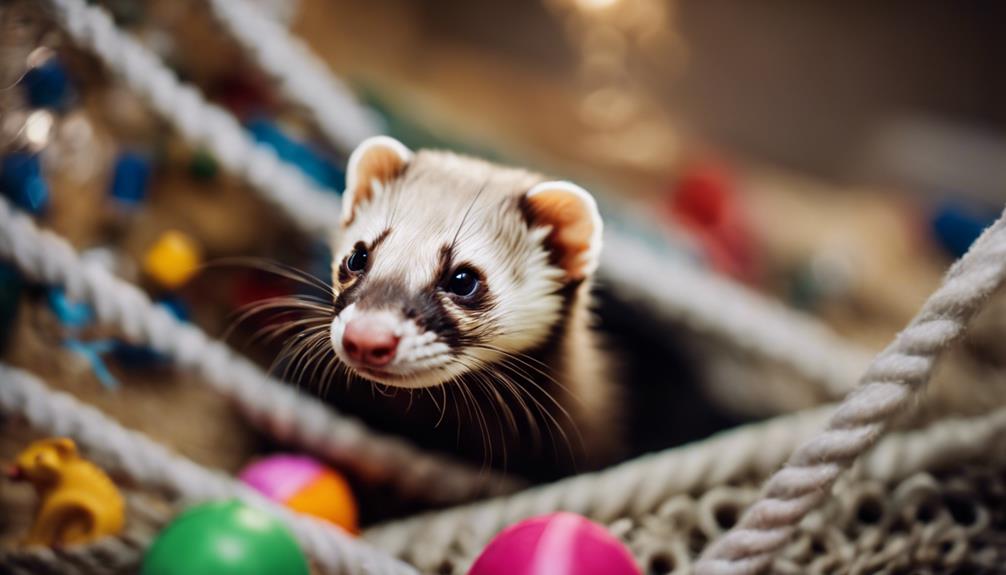Why Understanding Your Ferret's Behavior Can Improve Their Well-being

Understanding your ferret's behavior is essential for their well-being. Ferrets are curious and playful animals that require mental and physical stimulation to stay healthy. By observing and interpreting your ferret's behaviors, you can better meet their needs and ensure they are happy and content.
Some common behaviors in ferrets include digging, hiding, and playing. These activities are natural for ferrets and help them stay active and engaged. It is important to provide your ferret with opportunities to exhibit these behaviors in a safe and enriching environment.
Additionally, understanding your ferret's body language can help you communicate with them more effectively. For example, a ferret that is arching its back and puffing up its fur may be feeling threatened or scared. By recognizing these signs, you can adjust your interactions with your ferret to help them feel more comfortable.
In conclusion, taking the time to understand your ferret's behavior is crucial for their well-being. By paying attention to their actions and body language, you can provide a loving and supportive environment that meets all of their needs.
The Link Between Behavior and Well-being
Unlocking Your Ferret's Happiness: Understanding Behavior for a Happier Pet
Hey there, ferret friends! Ever wondered why your furry buddy acts the way they do? Well, understanding your ferret's behavior is super important for making sure they're happy and healthy. Let's dive into how you can help your ferret live its best life!
Why Behavior Matters for Ferrets:
- Knowing why your ferret does certain things can help you give them a great life.
- By learning about behavior, you can fix any naughty habits your ferret might have.
- Watching your ferret's actions can tell you if they're feeling good or if they need some help.
Supporting Your Ferret's Mental Health:
- Ferrets can feel stressed or anxious, just like us!
- If you spot signs of mental health issues in your ferret, you can step in early to help.
- Training your ferret with rewards, keeping them busy, and creating a safe space all help them feel good.
Tips for a Happy Ferret:
- Use treats and praise to teach your ferret good behavior.
- Keep them entertained with toys and activities to keep their minds active.
- Make sure their living area is safe and cozy for them to relax in.
Common Ferret Behaviors Decoded

Ferrets exhibit various behaviors that can indicate their well-being and state of mind. Understanding signs of stress, distinguishing between playful and aggressive behaviors, and recognizing how ferrets communicate through actions are crucial aspects of decoding their behavior.
Behavior Signs of Stress
Are you worried about your ferret's well-being? It's essential to know how to spot signs of stress in these furry friends. Ferrets, just like us, show specific behaviors when they're feeling stressed. Keep an eye out for these signals to ensure your ferret stays happy and healthy:
- Does your ferret scratch or groom excessively?
- Is your ferret hiding or seeking solitude?
- Have you noticed any changes in your ferret's eating or drinking habits?
- Is your ferret being aggressive towards other ferrets or humans?
- Does your ferret seem more vocal or restless than usual?
Playful Vs Aggressive
Unraveling the Mystery: Playful or Aggressive?
Ever wondered how to tell if your ferret is just playing or being aggressive? Let's dive into the world of ferret behavior to decode their actions and ensure a happy coexistence with these lively pets!
� Playful Behavior:
- Mimicking hunting antics: Pouncing, nipping, and chasing are all part of their playful nature.
- High energy levels: Playful ferrets are full of excitement and vigor.
- Submissive gestures: Backing away, rolling onto their backs, or making clucking sounds signify a playful demeanor.
� Aggressive Behavior:
- Persistent biting or hissing: Signs that playful behavior may be taking a more aggressive turn.
- Redirecting behavior: It's essential to guide ferrets towards suitable activities to prevent aggression.
Understanding your ferret's play style is key to fostering a fun and safe environment for both you and your furry friend. By providing the right toys and interactive playtime, you can channel their energy positively and strengthen your bond with these playful pets.
Communication Through Actions
Discover What Your Ferret is Trying to Tell You
Have you ever wondered what your playful ferret is trying to communicate with its actions? Let's unravel the mysteries behind your furry friend's gestures to deepen your connection with them.
Here are some common behaviors of ferrets explained in simple terms:
- Pawing: When your ferret gently paws at you or objects, it's their way of seeking attention or signaling they want to play.
- Dooking: If you hear your ferret making a joyful chuckling sound, that's their way of showing excitement or happiness.
- Arching Back: When your ferret arches its back, it might be feeling scared or defensive, so offering reassurance can help calm them.
- Tail Wagging: A wagging tail in a ferret indicates they're excited or curious, especially when exploring new places.
- Blanket Burrowing: If your ferret loves to burrow into blankets, it's a natural behavior mimicking their wild ancestors' burrows, creating a cozy and secure sleeping space.
Understanding these behaviors can help you build a stronger bond with your ferret and ensure they feel happy and secure in their environment.
Enrichment Activities for Happy Ferrets

Ferrets thrive on mental and physical stimulation, making toy rotation a key aspect of their enrichment.
Providing DIY tunnels can offer endless exploration opportunities and mimic their natural burrowing instincts.
These activities are vital in keeping ferrets happy, healthy, and engaged in their environment.
Toy Rotation Benefits
Unlock the Fun: Why Toy Rotation is Essential for Your Ferret's Happiness
Hey there, ferret friend! Do you know that switching up your ferret's toys can keep them entertained and happy? Let's dive into why toy rotation is super important for your furry buddy:
- Curious Creatures: Rotating toys stimulates your ferret's curiosity and sparks their creativity. It's like giving them a new puzzle to solve every time!
- Say No to Boredom: By switching toys, you prevent your ferret from getting bored with the same old playthings. Variety is the spice of life, even for ferrets!
- Get Moving: Different toys encourage your ferret to be more active. It's like having a mini workout session while having fun!
- Brainpower Boost: Toy rotation helps enhance your ferret's problem-solving skills. It's like a mental gym session for your clever critter!
- Thrill of the New: Introducing new toys regularly brings excitement and novelty into your ferret's playtime. Who doesn't love a surprise?
DIY Tunnel Fun
Are you looking for fun ways to keep your ferret entertained and happy? DIY tunnel projects are a fantastic way to enhance your ferret's environment and provide them with engaging activities. These projects offer a mix of physical and mental stimulation that are essential for your furry friend's well-being.
Let's dive into some simple yet effective DIY tunnel ideas:
- Cardboard Tunnel:
- Materials Needed: Cardboard tubes
- Benefits: Encourages exploration and tunneling behaviors.
- Fabric Maze:
- Materials Needed: Fabric, hangers, clips
- Benefits: Provides mental stimulation and a fun maze-like experience.
- PVC Tunnel System:
- Materials Needed: PVC pipes, connectors
- Benefits: Promotes physical exercise and agility for your ferret.
Recognizing Signs of Stress and Anxiety

Is your furry ferret feeling stressed or anxious? Just like us, our little ferret friends can experience emotions that affect their well-being. Let's learn how to spot the signs of stress and anxiety in your ferret:
- Signs of Stress: Keep an eye out for changes in behavior like being more aggressive, licking excessively, or hiding away.
- Behavior Clues: Notice any sudden changes in their eating, sleeping, or grooming habits.
- Triggers for Anxiety: Figure out what might be stressing them out, like loud noises, sudden movements, or changes in their surroundings.
- Body Language: Watch for signs like pacing, restlessness, or lots of yawning that could indicate distress.
- Get Vet Help: If you see these signs often, talk to a vet for advice and support.
Bonding With Your Ferret Through Play

Are you looking to have some fun with your ferret while strengthening your bond? Interactive play sessions are the way to go! Not only will you both enjoy the time together, but it's also a fantastic way to build trust and grow closer to your furry friend. Let's dive into the world of bonding through play with your ferret:
- Why is play important for your ferret?
- Prevents boredom
- Reduces stress
- Encourages natural behaviors like hunting and exploring
- What can you do during playtime?
- Use toys, tunnels, and even play hide-and-seek
- Observe your ferret's unique personality traits
- Discover their likes and dislikes
- How does play benefit you and your ferret?
- Strengthens your bond
- Provides mental stimulation and exercise
- Creates a rewarding experience for both of you
Creating a Safe and Stimulating Environment

Are you wondering how to create a fun and safe space for your playful ferret? Check out these tips to keep your furry friend happy and healthy:
- Stay Safe: Keep electrical cords and small objects out of reach to prevent accidents.
- Playtime Galore: Provide a variety of toys to keep your ferret active and entertained.
- Feed the Brain: Challenge your ferret with puzzle feeders or hide treats for a mental workout.
- Cozy Corners: Set up tunnels, hammocks, or boxes for your ferret to relax or hide in.
- Bonding Time: Spend quality time with your ferret through play and cuddles to build a strong relationship.
Seeking Professional Help When Needed

Is your pet ferret acting strange or not feeling well? It's time to get help from a special vet!
Hey there! If your ferret isn't acting like its usual self or seems sick, it's essential to take them to a vet who knows a lot about exotic pets. These vets can figure out what's wrong and give the right treatment to help your ferret feel better. They can also teach you cool tricks to help your ferret behave better!
Here are some things these vet experts can help with:
- Making your ferret behave better using treats and rewards
- Making your ferret's home more fun and exciting
- Teaching your ferret to follow a target or play games
- Helping your ferret get used to things that scare them
- Playing with your ferret in a fun and interactive way
Frequently Asked Questions
How Do Ferrets Communicate With Each Other and With Humans?
Ferrets communicate through body language, using gestures like dancing or puffing up to show excitement. They also make various vocalizations such as chirping or hissing. In social interactions, they engage in playful behavior like chasing and wrestling.
What Are Some Common Health Issues That Can Affect a Ferret's Behavior?
When ferrets experience health issues, their behavior may change. Stress indicators like excessive scratching or lethargy could signal illness. It's vital for owners to recognize these behavioral changes and seek veterinary care promptly for their furry friends.
Can Ferrets Be Trained to Perform Certain Behaviors?
Ferrets can be trained to perform certain behaviors through positive reinforcement training methods. By observing their behavioral cues and understanding their natural instincts, owners can effectively teach ferrets tricks, improve behavior, and enhance their well-being.
How Can Changes in a Ferret's Environment Affect Their Behavior?
Environmental stressors, like changes in light or noise levels, can impact a ferret's behavior. Behavior modification strategies can help alleviate stress. Social interactions and enrichment activities are vital for maintaining a healthy and balanced ferret.
Are There Specific Dietary Considerations That Can Impact a Ferret's Behavior and Well-Being?
Nutritional balance is crucial for a ferret's well-being. Certain food sensitivities can trigger behavioral changes. Understanding and providing the right diet tailored to a ferret's needs can positively impact their behavior and overall health.











